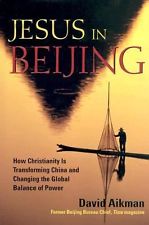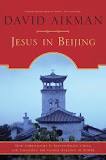David Aikman: Jesus in Beijing
 David Aikman, Jesus in Beijing: How Christianity is Transforming China and Changing the Global Balance of Power (Washington, DC: Regenery, 2003), 344 pages.
David Aikman, Jesus in Beijing: How Christianity is Transforming China and Changing the Global Balance of Power (Washington, DC: Regenery, 2003), 344 pages.
Remarkably, this book is simultaneously profoundly spiritual and provocatively political. Its main thesis is that Christianity is slowly but surely changing China and a changed China may change the world. In readable journalistic style Aikman overviews the history of Christianity in China, analyzes its diversity, introduces us to many of its exciting personalities, and outlines political and cultural complexities in the story of Christianity in China. Hands-on experience and research enhance Aikman’s effectiveness. The suffering and strength of many persecuted Christians pervade the whole work. An inexorable forward march of the Christian faith in China against incredible opposition builds throughout to a climactic finish with an optimistic future. Balanced, objective discussions of distinctive Christian groups and their differences are insightful and helpful.
Four assertions of this work call for more detailed dialogue: an inseparable interconnectedness of Christianity, culture, politics, and economics in China; Christianity in the Chinese context is most effective when it assumes an indigenous and inclusivist air; Evangelicals and Pentecostals are at the heart and forefront of Chinese Christianity; and, the story of Christianity in China has national and global consequences.
Dynamic relationships between religion, culture, politics, and economics certainly exist (cf. Dan. 2:46-49). Aikman notes that changing fortunes of the Christian faith in China reflect simultaneous fluctuations of socio-political-economic factors. From the beginnings of Christianity in China until contemporary times the vicissitudes of frequent and often contradictory cultural changes have affected Christianity’s status almost as much as it’s own spiritual qualities (pp. 19-45). Not a new idea (Max Weber explored relations between religion and economics), it nevertheless needs acknowledging that Christianity is part of a complex of components, secular and sacred, that cannot be adequately understood in isolation. Religion is not only an attempt to relate well to the eternal world beyond but also to this temporal world below.

Cover from the 2006 edition.
Paul employed intentionally indigenous (original culture) and inclusivist (openness to others) approaches to witnessing relations with non-Christians (1 Co. 9:19-23; Acts 17:16-34). According to Aikman, historically missionaries who appreciated and appropriated China’s native dress, customs, and language were consistently more effective than those who did not, in spite of attendant controversy (pp. 30-41). Furthermore, contemporary Chinese Christians able to connect their message and mission with China’s non-Christian religious heritage are making headway with thoughtful moderns (pp. 245-49). In a time of increasing awareness of religious diversity and plurality Christian witness that refuses to compromise its own convictions but yet affirms and embraces the cultural history and spiritual heritage of others (in the tradition of C. S. Lewis) may be the most effective way to evangelize.
Category: Church History, Winter 2006


